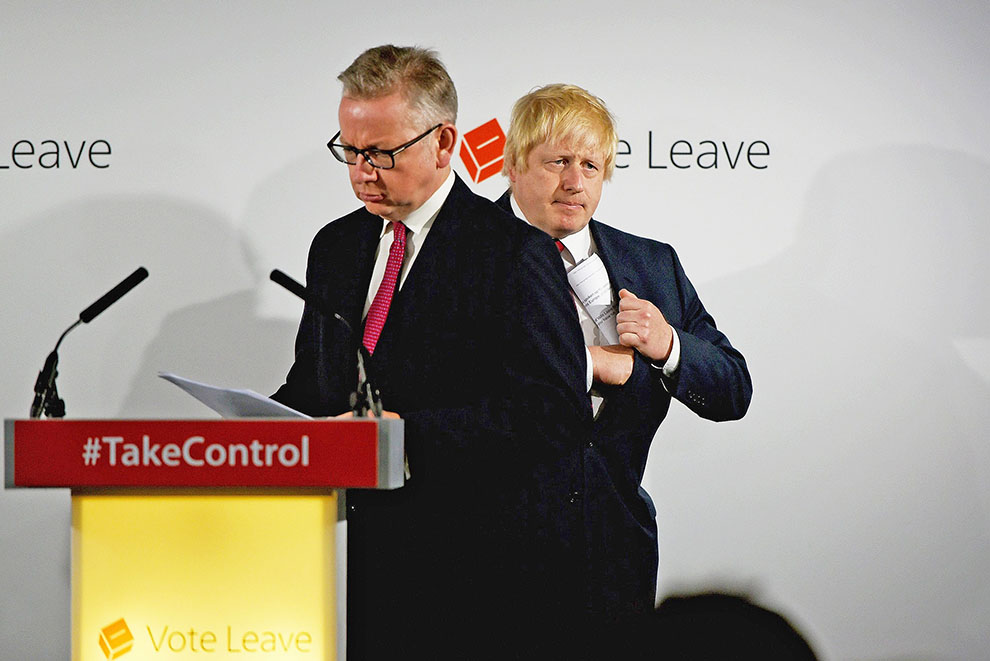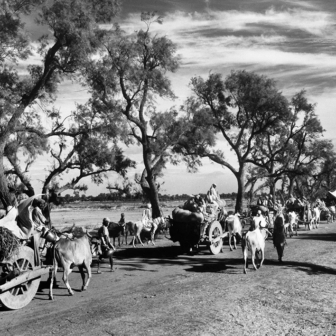There are moments that concentrate decades. The days 23–24 June 2016, when Britain voted to leave the European Union, were one. The decision to end forty-three years of economic and political association with its continental partners was seismic enough. Within hours, the reverberations had toppled a prime minister, threatened the integrity of the state, alarmed allies, dislocated financial markets, recalibrated global politics, and sparked a political coup in the opposition Labour Party. The very air felt different. Those responsible, in the neighbourhoods, town centres, pubs and cafes where English people congregate, seemed more confounded by than triumphant at what they had done. But as the day ended, everyone was conscious of having been participants in a moment of History they would never forget.
The onrush of events followed the “Leave” side’s victory in the United Kingdom–wide referendum, by a margin of 51.9–48.1 per cent of the vote. In retrospect, that outcome had been prefigured by early declarations from counting centres in England’s urban northeast. But through a tense night, “Remain” supporters continued to draw comfort from late polls suggesting they would win narrowly, and the belief that populous London, jewel in the pro-European crown, would carry them over the line.
Such brittle confidence slowly dissolved in the face of an England-centred tidal wave. Just after 7am on Friday, official results confirmed that this had broken the defensive wall of the UK and international establishment. Brexit, for decades a quixotic ambition of the political right (nativist and free-market wings, each with trenchant newspaper support), was now – exhilaratingly to its advocates, dumbfoundingly to opponents – on track to be Britain’s reality.
The premiership of David Cameron, who had called the referendum in 2013 to end Europe’s disabling impact on his Conservative Party and staunch defections to the United Kingdom Independence Party, or UKIP, was shattered. An hour later he was at the podium outside 10 Downing Street, the presence of his wife Samantha stilling any doubt that this indeed was the end. A graceful statement – as a performer Cameron is in the Ronald Reagan class – acknowledged the British people’s “clear decision to take a different path.” The country now needed “fresh leadership to take it in this direction.” He would “steady the ship” for three months, but “I do not think it would be right for me to try to be the captain that steers our country to its next destination.”
The UKIP leader, Nigel Farage, briefly exulted in the referendum triumph (and claimed it as his own), before the leaders of the official Vote Leave organisation, Boris Johnson and Michael Gove, shuffled into the limelight. The words were all there – tributes to Cameron and to the British people (who “have spoken up for democracy in Britain and across Europe,” said Johnson) – but these cabinet members’ almost funereal mien was striking. Was this awe at their new responsibility, or fear that savage payback for their brazen campaign was now certain? (Their demeanour made me think of the climax of David Lean’s The Bridge on the River Kwai, and Alec Guinness’s “What have I done?”)
Almost simultaneously, Scotland’s first minister, Nicola Sturgeon, hosted a press conference in Edinburgh, citing the country’s 62 per cent vote for Remain to justify preparations for a second independence referendum (following the one in 2014 where the “yes” side won 45 per cent). It would be a violation of democracy were the Scots to be pushed out of the European Union against their wishes, she said. Her expression of “clear common cause” with London, which voted 60 per cent to stay in the EU, was echoed by the city’s new mayor, Sadiq Khan, who insisted London must have “a voice at the table alongside Scotland and Northern Ireland” in coming “renegotiations” with the union.
The Labour opposition had formally supported Remain, but its leader Jeremy Corbyn couldn’t muster enthusiasm for a cause he had stood against for four decades. Two senior Labour MPs, Margaret Hodge and Ann Coffey, opened an effort to unseat him by writing to the party’s parliamentary chair.
Several of the EU’s many presidents – forceful Donald Tusk (intergovernmental council), hapless Jean-Claude Juncker (commission), imperious Martin Schulz (parliament) and Cameron-style smoothie Mark Rutte (whose Dutch government holds Europe’s rotating presidency until July) – were also on the case, urging Britain to move quickly to seal its exit.
Across London, as sterling and equity prices plunged on international exchanges, company directors and financiers were putting their Brexit emergency plans into action and thinking hard about a post-Britain future. And it was not even lunchtime.
The agents of this insurgency, who included Welsh voters (52.5 per cent for “out”) as well as English (53 per cent), had every reason to celebrate. Some did, though others were perplexed by the effects of their boldness, and yet more turned instantly into “Bregretters.” By Saturday, the triumphalism of the Sun, Telegraph, Express and Mail was already sounding passé (“It was the day the quiet people of Britain rose up against an arrogant, out-of-touch political class and a contemptuous Brussels elite,” whooped the front page of the Mail’s “historic edition.”)
Variants of this analysis, often quoting G.K. Chesterton’s famous line (“But we are the people of England; and we have not spoken yet”), are everywhere. It draws on copious evidence of widespread and often visceral social frustration: with shrinking public facilities, security of employment, wages, living standards and life chances; with remote and indifferent governments in Westminster and in Brussels; with powerlessness and alienation amid disabling economic changes; and with large-scale and uncontrolled immigration, which can alter the character of neighbourhoods as well as adding unwelcome elements of competition for jobs, homes and services. Most current dispute concerns the immigration that followed the EU enlargements in 2004 and 2007, which have attracted over 800,000 Poles and sizeable contingents of Balts, Romanians and Slovakians.
Several of these trends pre-date the squeeze in public spending of recent years, but have been accentuated by them. They also vary greatly in intensity within and between regions. More complicating are three factors. First, broad narratives and anecdotal accounts of immigration-sourced tension often eclipse successful adaptations on all sides at local levels. Second, many areas that voted strongly for Brexit, such as northeast England and Wales, are comparatively little affected by immigration. Third, the framing of arguments about those dispossessed (or “left behind”) by globalisation is often intensely partisan, both in the media and among political groups, and fuelled by anecdotes of doubtful vintage, in ways that can occlude more than enlighten.
None of this is to minimise the character of the referendum verdict, which Saul Eslake describes elsewhere in Inside Story as “a victory of the old over the young; of the fearful over the hopeful; of the angry over the ambivalent; of the insular over the cosmopolitan; and of an imagined past over an uncertain future.”
It was also clearly an immense collective protest against present economic and social conditions, perhaps using both “Europe” and “immigration” as proxies for these conditions as much as issues defined as such in the electorate’s minds. That protest cannot be ignored, and must be respected and acted upon. Equally, governmental and other responses have to grasp an often complex reality and resist the temptation to indulge easy rhetoric and prejudice (including of the counter-establishment or counter-elite kind, where, for example, “Westminster,” “London,” “Brussels,” and “Europe” are loaded with a vitriol utterly destructive of rational argument).
That also said, the largest component of the vote can also be read as an expression, still inchoate, of English nationalism. Many currents flow into this other than socioeconomic ones: a sense of injustice at the greater self-government won by the UK’s other nations and consequent desire for a rebalancing, a narrative of underdog resistance against entrenched power, a post-imperial discomfort with the loss of top-dog status, a search for identity-based agency in a competitive political market.
What this tendency (or “version of tribalism,” in John Quiggin’s words) doesn’t yet have is a political project, at least not an explicit one. The jubilant description of the referendum result, embraced by UKIP in particular, as “independence day,” is an empty slogan. That absence reflects how hard it is in practice to disentangle Englishness and Britishness, and to give the former political content (albeit serious efforts are being made). Thus, prolific English cultural assertion generates no popular interest in creating distinctive English institutions.
The lack of a binding political aspiration, the sort that can give an ethnos or proto-nation a focus for action and exploration, might in other times or countries be a handicap. For most English people, their statehood and citizenship guaranteed, the result is an unusually relaxed national identity. In settled periods and among the comfortable, that continues. But insecure ones have given a free pass to nostalgia, irrationalism, archaism and incuriosity, and pushed these forces (as with Trumpism in the United States) into the political arena. A regressive phrase again promoted by UKIP and embraced more widely – “we want our country back” – underlines both the vacuum and the danger in this English avalanche. Call it the revenge of anti-politics.
This is not the resurgence of ancient “tradition,” it need hardly be said, but something very modern: indeed, part of the same “globalisation” that political exploiters of emotion regularly denounce. Nostalgia, after all, also entails invention of the past, so often a prelapsarian era of indeterminate date (but always oddly coinciding with the speaker’s youth) when all was ordered, prosperous, harmonious – and implicitly, in England’s case, pre-“Europe” and all-white or immigrant-free.
It is relevant here to note the age distribution of referendum voters. On a UK-wide basis, those sixty-five and over opted 60–40 for Leave, compared to 56–44 among forty-five- to fifty-four-year-olds, and 38–62 among twenty-five- to thirty-four-year-olds, and 27–73 among eighteen- to twenty-four-year-olds. Class and education produced similar patterns, as did associated surveys of attitudes to immigration, social liberalism and the environment. In the thirty areas with the most elderly people, twenty-seven voted Leave; with the most identifying as English, twenty-seven; and with the fewest graduates, twenty-eight. Moreover, the “Leave vote was strongest in regions most economically dependent on the EU.” Which recalls James Donald’s coda as the Kwai bridge exploded: “Madness!”
Strathclyde University’s John Curtice, a polling expert whose reputation has survived the industry’s embarrassments in 2015–16, notes the English dimension of such findings:
For many in England one key reason to leave was that Brussels should not be able to tell Britain what to do. This is common among those who think of themselves as English rather than British. No less than 79 per cent of those who feel that way voted to leave compared with 40 per cent who feel British rather than English.
A twist is that while 68 per cent of voters from ethnic minorities supported Remain, many who arrived as immigrants in previous cohorts express sentiments similar to their Britain-born neighbours. A report in 2015 by the Runnymede Trust finds ambivalence in minority groups over the EU’s benefits and reluctance to take advantage of the free movement it allows, while prominent figures and supporters of the Leave campaign were BAME (black, Asian and minority ethnic) people.
England’s Brexit choice may end up smashing the United Kingdom – and, as if for fun, its leading political parties. The decision has revealed a country split in many different ways, released a new dynamic towards Scotland’s independence, handed Sinn Féin a golden opportunity to press its demand for a “border poll” leading (it hopes) to Ireland’s unification, and engulfed both Conservative and Labour parties in damaging leadership contests.
While the Tories are gearing up for a two-way contest between Boris Johnson and (most probably) home secretary Theresa May, Labour’s crisis is a study in entropy – just like its leader, who on Sunday sacked one member of his shadow cabinet and saw eleven more resign, to be followed by more on Monday. Jeremy Corbyn has promised to stay on to represent his “different kind of politics.”
More even – even! – than all of this, England’s Brexit has made it likely that the UK will become weaker and poorer, more isolated and vulnerable, less significant and influential. In this condition, it has propelled the state into years of hard negotiation about the fundamentals of its trading and diplomatic relationships with its leading partners and most important allies. It is, as the Irish Times says – among many such voices in that bruised country – “a bewildering act of self-harm.”
“The task now is to make the best of a bad job,” says the Sunday Times’s fine economics editor, David Smith. It’s a phlegmatic response, the best of England. We’ll need much more of that to get through the coming years. But who are “we,” and how do we relate to “others”? The answers, to be forged amid the crises to come, will give Brexit its answer. •




